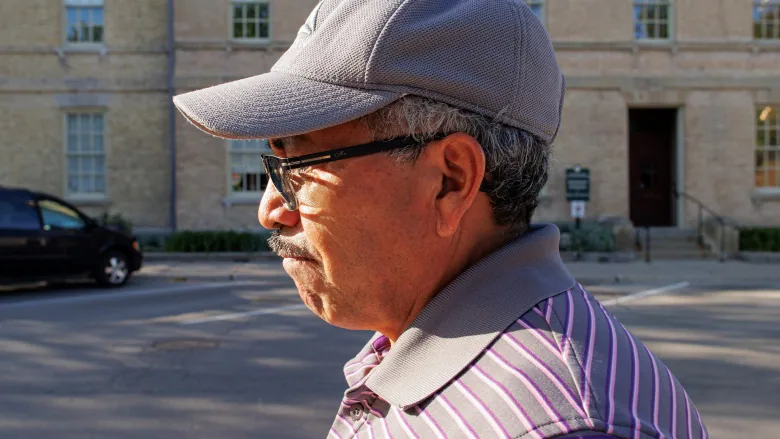This article was originally published on CBC.ca – https://www.cbc.ca/news/canada/hamilton/pedro-mondragon-rodriguez-migrant-worker-simcoe-1.6868836
Pedro Mondragón Rodríguez started travelling to Canada to work as a farm worker in 2000.
Life back home in Úrsulo Galván, Mexico, wasn’t glamorous, he said, but it was good. It was a life he wanted to go back to full-time, so he started planning his retirement.
He bought a dump truck to start building a “legacy” and planned to live back in Mexico with his wife, instead of leaving for eight months each year to work in rural southwestern Ontario.
But on a November evening in 2021, his world came crumbling down.
His only daughter and eldest child, 37-year-old Karina, was diagnosed with Stage 4 breast cancer.
‘If I’m not OK, she’s not OK’
His wife Adelaida Hernández Melgarejo broke the news.
Mondragón Rodríguez recalls his wife starting to cry suddenly on one of their regular evening calls. His mind went through every scenario.
“Because of the distance and how much time we spend away from each other, I thought she found someone else,” he said.
Then, “she said, ‘our daughter has cancer.’”
Karina Mondragón Hernandez, 37, is also a mother of two, and is pictured with her daughter. (Submitted by Pedro Mondragón Rodríguez)
Doctors had told her their daughter might have three or four months to live.
“I cried so much … I try to be OK because I know if I’m not OK, she’s not OK,” Mondragón Rodríguez said.
Retirement on hold
Since then, 58-year-old Mondragón Rodríguez has been doing everything he can to help in his daughter’s recovery, including giving up his retirement plans.
He says he came back to Canada this spring to work with mixed feelings.
“In a way, I come here happy because I have the hope of working here and earning enough to send her money,” he said. “But at the same time, I feel bad leaving her because I don’t know what will happen.”
Mondragón Rodríguez says he earns around $1,200 every two weeks, which is not enough to cover all of his daughter’s chemotherapy sessions — which are around $1,000 weekly — and the many medications she needs for treatment.
His story has moved the local community. Enrique Martinez, a priest from Cúcuta, Colombia, now living in Norfolk County, made an impassioned plea to support Mondragón Rodríguez and his daughter.
While in Canada, Mondragón Rodríguez said he has to “set melancholy aside” and get to work as the head of his group of co-workers at the Berkel Greenhouse in Simcoe, Ont.
“It’s so hard, I’ve been a strong man here, you’ll never see me down,” he said.
He copes by reading books, the Bible, listening to music, and helping others.
As the oldest, most experienced man both at work and in his bunk house, Mondragón Rodríguez has become a guide and role model for the newer workers.
“Most of them could be my sons,” he said, and some even call him “Papá.”
He said he helps them with translating from English to Spanish at banks and shops, but he also keeps them in line.
“I scold them and advise them … [I tell them] we have to keep a clean house,” he said.
One of his co-workers and housemates, Gabriel Del Rosario Villegas, called him “a wonderful person,” in an interview translated from Spanish.
“He has a huge heart” and “always takes the time” to help other workers, Del Rosario Villegas said.
The pair met last year in St. Catharines, Ont., after Del Rosario Villegas had a bad experience with an employer.
“Thanks to him, I have this [new] job.”
Not a unique issue among migrant workers
Father Martinez sees Mondragón Rodríguez each week at the Trinity Anglican Church, where the priest and Toronto-based The Neighbourhood Organization (TNO) host social events and offer a hot meal to migrant workers.
Mondragón Rodríguez drives his co-workers into town to participate in the program, buy groceries and access other services TNO offers at a nearby office.
Father Martinez said although Mondragón Rodríguez’s case was very sad and has its own set of circumstances, it’s not rare.
“You will see a situation like this with many workers,” he said.
“Many of them will tell you ‘if it wasn’t because of our home-country’s situation, I wouldn’t be here.’”
In Mondragón Rodríguez’s case, the next few months are crucial.
His working season ends in September and his financial anxiety is at an all-time high.
Between debt, the little money he earns here and Karina needing nine more sessions of chemotherapy, the math is simply not adding up.
“Honestly I won’t be able to [continue paying for treatment], I don’t know what I’m going to do,” he said.
For now, he continues to work with his hands in Canada, while his heart stays in Úrsulo Galván. There, the daughter he remembers as “always so sweet, so playful, always happy” is now engulfed in a depression brought on by her illness.
“Even if I can’t find the help [we need] I will keep fighting. I will not stop.”

